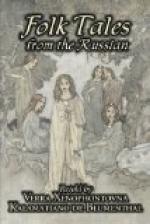The Tsar Archidei became thoughtful.
“Well,” he said to the merchant guests, “you have my thanks, guests of passage, respectable men of trade. Go in God’s name, transact business in my tsarstvo without any taxes whatever. What to do about the beautiful Princess Helena I will try to think out by myself.”
The merchants bowed low and left the Tsar’s rich palace.
The Tsar Archidei sat still, wrapped in thought, but he could find neither beginning nor end to the problem. “Let me ride into the wide fields,” he said; “let me forget my sorrow amid the excitement of the noble hunt, hoping that the future may bring advice.”
The falconers appeared, cheerful notes from the golden trumpets resounded, and falcons and hawks were soon slumbering under their velvet caps as they sat quietly on the fingers of the hunters.
The Tsar Archidei Aggeivitch came with his men to a wide, wide field. All of his men were watching the moment to loose their falcons in order to let the birds pursue a long-legged heron or a white-breasted swan.
Now, you, my listeners, must understand that the fairy tale is quick, but life is not. The Tsar Archidei was on horseback for a long while, and finally came to a green valley. Looking around he saw a well cultivated field where the golden ears of the grain were already ripe, and oh, how beautiful! The Tsar stopped in admiration.
“I presume,” he exclaimed, “that good workers are owners of this place, honest plowmen and diligent sowers. If only all fields in my tsarstvo were equally cultivated, my people need never know what hunger means, and there would even be plenty to send beyond the sea to be exchanged for silver and gold.”
Then the Tsar Archidei gave orders to inquire who the owners of the field were, and what were their names. Hunters, grooms, and servants rushed in all directions, and discovered seven brave fellows, all of them fair, red-cheeked, and very handsome. They were dining according to the peasant fashion, which means that they were eating rye bread with onions, and drinking clear water. Their blouses were red, with a golden galloon around the neck, and they were so much alike that one could hardly be recognized from another.
The royal messengers approached.
“Whose field is this?” they asked; “this field with golden wheat?”
The seven brave peasants answered cheerfully:
“This is our field; we plowed it, and we also have sown the golden wheat.”
“And what kind of people are you?”
“We are the Tsar Archidei Aggeivitch’s peasants, farmers, and we are brothers, sons of one father and mother. The name for all of us is Simeon, so you understand we are seven Simeons.”
[Illustration: “Hunters, grooms, and servants rushed in all directions”]
This answer was faithfully delivered to the Tsar Archidei by the envoys, and the Tsar at once desired to see the brave peasants, and ordered them to be called before him. The seven Simeons presently appeared and bowed. The Tsar looked at them with his bright eyes and asked them:




